Ted Sorensen on Obama:
And I believe, yes he can
By: Thorsten Overgaard
81-year-old personal friend and counselor of John F. Kennedy, mastermind speechwriter of famed speeches such as “Ask Not What Your Country Can Do For You,” in this exclusive interview gives his personal story on why he believed in Obama for president long before anyone else, and why now, a month into the Obama Era, he believes President Obama is the right man for the job. Choosing the right man
He’s blessed with a talent for words that has made historic speeches for late John F. Kennedy. He’s 81 years old now and live with his wife in New York. In May last year he published his biography of a life on the edge of history; 11 years with John F. Kennedy and since then as counsel for many world leaders, politicians and CEO’s out of his New York law firm.
In 2001 he suffered a stroke and only by pure will to live, he explained some time ago, did he manage to survive and get back on his feet. Now, eight years later, he’s as good as new, except for that weak eyesight that has made him almost blind, and which required him to have an assistant help him read all his notes he made over the years in order to write the ultimate biography of his life. The assistant who helped him read the notes is interestingly enough Obama’s second speechwriter now – but more on that later.
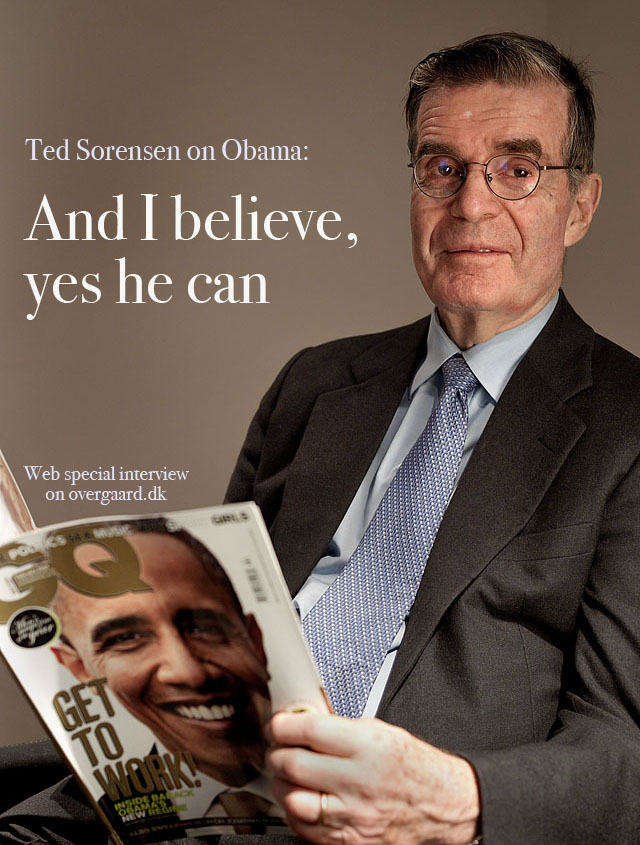
SORENSEN: “Don’t worry about my eyesight. Last year I had more vision than the president of the United States!” says the almost blind Sorensen, and so, in few words, talk of the past president and all other past illness has been covered in one sentence!
We’re here to talk about the future, which he has had some small part in as well. Because, apart from his magic touch with words, Sorensen is apparently also blessed with a talent to spot the right man, long time before anybody else. He’s done so in both he case of John F. Kennedy and President Barack Obama.
SORENSEN: “I didn’t know Barack Obama but I had met him briefly before 2007 and I had been impressed. I knew Hillary Clinton quite well, I knew Bill Richardson of New Mexico, I knew Chris Dodge of Connecticut, I knew a little bit of most of the presidential candidates. But the one I liked the most was Obama – because he reminded me of Kennedy: A young senator who wanted to be president and someone who had a very difficult demographic obstacle to face. In Kennedy’s case his religion; in Obama’s case his skin color.“
Few perhaps know how little chance Kennedy actually had to become president, and of this Sorensen tells: “In 1952 two young new senators in the Democratic Party offered me jobs. They both seemed like good progressives, good people. I was torn as to which one I should go to work for, especially when my seniors – my mentors – in Washington said ‘don’t go with Kennedy. He’s just a young dilettante; he’s too close to his conservative father. Instead, go with Henry Scoop Jackson from the State of Washington. He is the voice of the progressive North-West, he is really going places.’ I didn’t know what to do because I had been more impressed in my brief meeting with Kennedy. So being young and presumptuous I decided I would go back and re-interview both of them and ask them what it was they wanted me to do.
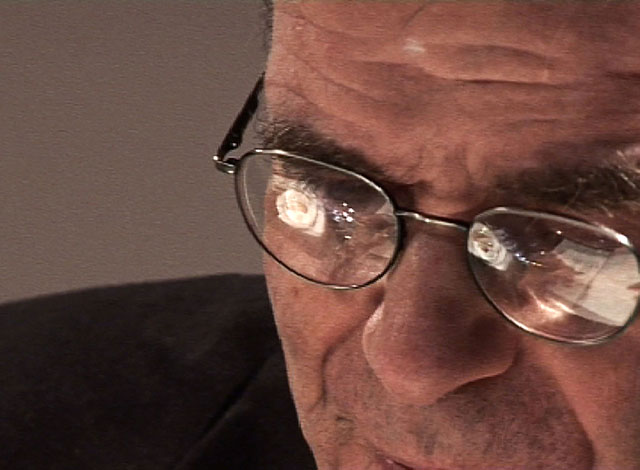
Kennedy said he wanted me to help formulate a program for the economic revitalization of New England, which was in a long economic slump where they had lost most of their industry to the South.
Jackson said he wanted me because he had heard I was a smart lawyer and it would be good to get his name in the newspapers. And then because I had an Scandinavian name, that would be very helpful for him back in Seattle, Washington, which had a lot of Scandinavians.
Well, between those two challenges I thought Kennedy offered the more interesting challenge and I went with Kennedy and stayed with him for 11 years.”
“My working in the White House was almost an accident of history. When I grew up I went to Washington because I was interested in public policy. I soon met the young senator from Massachusetts and after I had worked with him for eight years, he was elected president. He went to the White House and he wanted me to join him in the White House.
There I was, working with the man who had become president after I had worked with him for eight years when he was a senator and a presidential candidate. And I learned so much from him, he was not only my friend and my boss, he was also my mentor.“
Obama, like Kennedy
“And it was in large part because of Kennedy’s example that two years ago, early in 2007, I became interested in the Obama campaign and decided that Obama was more like John F. Kennedy than any candidate for president, since Kennedy’s death in 1963, with the exception of Robert Kennedy. Obama and Kennedy were both young senators when they started out. Obama and Kennedy had both lived abroad, which gave new insight on foreign policy. Obama and Kennedy were both good speakers who reached out to young people in this country and wanted to bring them back into politics and government. And most of all Obama and Kennedy were both given no chance of winning because of the demographic obstacle; In Kennedy’s case the first Roman-Catholic to be president, and in Obama’s case the first African-American to be president.
But I thought, Obama like Kennedy can win. He can overcome those handicaps. And so I endorsed him early [March 9, 2007].”
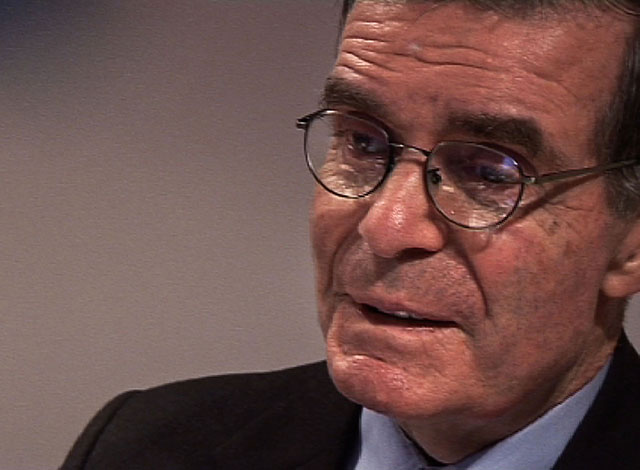
Campaigning for Obama
“The Obama team sent me out to 7-8 states to speak for him as a surrogate. I also introduced him to large audiences in New York, Chicago, Iowa and elsewhere. As a result people say to me, ‘aren’t you going to work in the Obama White House?’ And I’m old and I don’t see very well, and I say to them a line from Kennedy’s inaugural address, ‘The torch has been passed to a new generation of Americans.’ That’s what Kennedy did when he took office in January 1961. He and his generation inherited a torch of American leadership and liberty from the older generation of Eisenhower and Truman. And that is what Obama is doing right now, he and his very young team have taken over the leadership, the torch. “
Judgment comes from the hearth
A few years back when I spoke with Sorensen about his upcoming biography which I knew he was working on, and in which he would be covering all the statesmen, world leaders and leaders of major corporations, which he had met and worked with throughout his life, I asked him what in his experience defines a great leader. Few people have been so close to so many in one lifetime. He thought about if for less than a second and then simply said one word: “Judgment!” “Obama showed great judgment in opposing the Iraq war before it started, and I’ve always thought that judgment was the most important criteria in selecting a president. So I choose Obama very early. No in those early days was really for him, and some of my friends said ‘why are you going out on a limp for somebody who doesn’t have a chance to be elected?’ I said, ‘I think he does have a chance. I think that like Kennedy he will overcome his demographic obstacles, he will prove that judgment comes from the hearth and the brain, not from sitting in the Senate for many years.’ So I choose Obama and it turned out he was a winner and I’m very happy that he is now president of the United States.”
Have you had any influence on the Obama speechwriting?
“Barack Obama has two principal speechwriters. The first is the very young and very very talented Jon Favreau who’s been with Obama throughout the campaign. Obama relies upon him for his important speeches. The number two speechwriter is a man who helped me write my new book, Counselor. I can’t see very well anymore, I needed someone to serve as my eyes, do the research, do all the coordination and logistics involved in putting a big book together. And so this very young man, Adam Frankel, whom I knew slightly, I asked him if he would work with me, and he fortunately said yes. So for years he was my right hand and my eyes in helping on the book. And when the book manuscript was finished and about to go to press, he left to join the Obama campaign. In part because I was supporting Obama, and in part because he had learned so much about speechwriting from me, that he wanted to be a speechwriter in the Obama campaign. And he proved to be so good that he was made the number two speechwriter! He still is. He is working with Favreau and Obama in the White House now! He and I are still in touch by telephone and he is a very happy and exited young man, and I’m very happy and exited for him.”
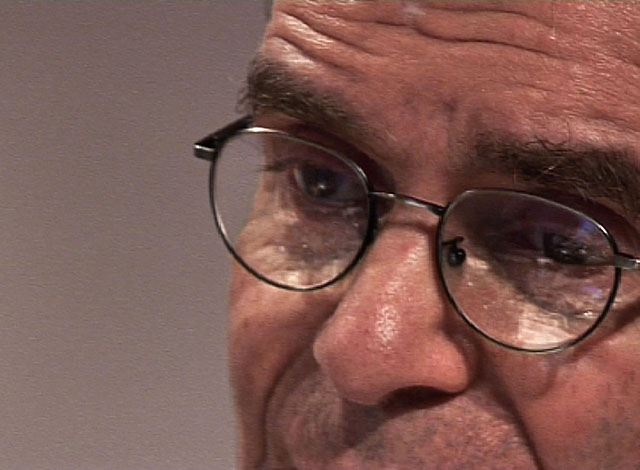
Most people think a speechwriter writes the speech and hand it over to the president, but that was not the case with you and JFK?
“No. Kennedy and I, whenever possible, would discuss the subject of the speech in advance. It would depend who was the audience, on the occasion, if it was a particular holiday or a particular debate that would dictate what would be the nature of the speech. Usually the position to be taken in the speech was one that he would outline to me. In the White House I had the advantages of being not only his speechwriter but his counsel and domestic policy advisor, so I would participate in some of those decisions. And then after he had he had made the decision walk down to my office a few steps away and out into a speech draft the decision I had just heard him make. So never ever did I just hand him a speech and he would get up and read that speech, having never looked at it before. I’ve know some politicians who did that – but never Kennedy!”
Do you see any similarities in the campaigns of Kennedy and Obama?
“Yes! Obama’s campaign, like Kennedy’s campaign, was at the grass roots. Kennedy and I traveled to every one of the fifty states together because he knew that is where the delegates come from. Kennedy knew that nominations don’t go to the man who has the most propaganda, the most headlines, the most endorsements … It goes to the man who has the most delegates. So he was opposed by an establishment candidate, just as Obama was. In Kennedy’s case it was the man he later picked for vice president, Lyndon Johnston. Lyndon Johnston was the majority leader of all the democrats in the Senate. He would announce that ‘Senator Green from Rhode Island had just endorsed his candidacy for president so he had Rhode Island.’ And Kennedy would turn to me with a smile because we knew we had Rhode Island (giggles). We had been working at the grass root level. Senator Green did not control all the delegation to the convention. The delegates at the convention were at the grass root level, mayors and state legislators and local party chairmen, people of that kind. And we’d been there. And we had them! And that is at that grass root level where Kennedy sued up the nomination and it’s at that grass root level that Obama sued up the nomination – and later the election.”
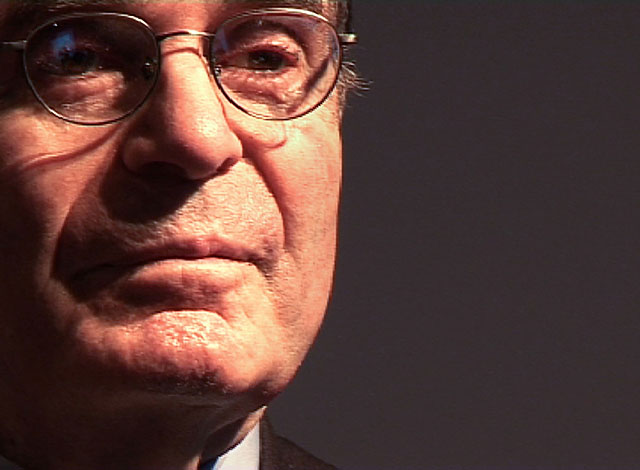
Why do you think people today compare the legacy of Kennedy to Obama?
“I think Obama reminds people because he is like Kennedy! He is more like Kennedy than any presidential candidate or president since Kennedy, other than Kennedys own brother Robert. Obama started out as a young senator just as Kennedy started out as a young senator. Obama was progressive and compassionate, just as Kennedy was progressive and compassionate. Obama wanted to see the United States leading with peace in the world, not military mind, and that was Kennedy’s position. And both Kennedy and Obama have reached out to young people, bringing them back into interest in politics and government. Both of them overcame the obstacles of demographics, Kennedy his religion, Obama his race. So of course people are reminded. And the Obama era in the United States I think could well be another era of hope and change and civility of discussion – just as the Kennedy era was a time of hope and change and civility.”
Did you ever meet Martin Luther King?
“Martin Luther King, when he led the so called Civil Rights March on Washington (August 28, 1963) to support Kennedy’s civil rights program, gave a great speech at the Lincoln Memorial where Obama, a few days before his inauguration this year, spoke at a wonderful concert and entertainment gala. I’m sorry to say Martin Luther King and I only spoke by telephone. We did not actually meet in person. Though Kennedy met with him and was impressed by the “I Have a Dream Speech.” Because King, instead of being negative and nasty talked in positive terms about the relations between black and white in the United States. Because Kennedy had already ‘turned that corner.’ And one of Martin Luther Kings dreams was when he said ‘the day will come when the hands that picked cotton’ – meaning black slaves – ‘the day will come when the hands that picked cotton will pick the next president of the United States.’ And on election night (November 4, 2008) I turned to a friend of mine as the television news said that large black voter majorities voted for Obama, in one city and state after another were giving him the election, I turned to my friend and I said, ‘That dream of Martin Luther King is coning through! The hands that picked cotton is picking the president of the United States.’”
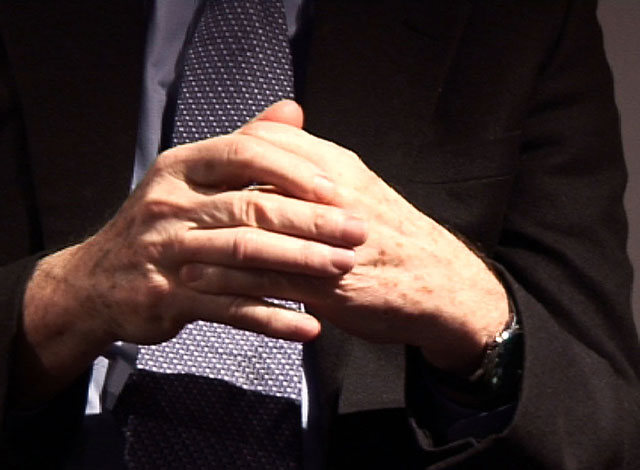
Which problems do you think Obama have faced that he have had to overcome?
“Obama, like Kennedy, faces a question of excessive expectations. So much needs to be done and he wants to do so much that people expect that in a short time he will do everything, that he will produce miracles, that he will solve every problem. The world doesn’t work that way. First, because there are difficulties and complications, second because controversial issues inevitable bring opposition from the opposition party and politicians. But also because the president doesn’t do it all by himself, he needs a team to work with in the administration, he needs congress to provide authorization, he needs other countries to provide cooperation. Kennedy had to achieve that and Obama also needs that, and in a sense you can say that ‘it’s their own fault’ because their speeches raised hope so high that people are bound to be disappointed. But there was a poet (Robert Browning) who wrote:
‘But a man’s reach
should exceed his grasp,
Or, what’s a heaven for?’”
If you had to give Obama’s speechwriters just one piece of advice, what would it be?
“I’ve occasionally given lectures on speechwriting, around the world, and once in Norway where I said – and I will say this to the Obama speechwriters today – a good successful speech should have four features, pretty easy to remember these four:
1. Clarity! Meaning the audience has to understand what it is you’re asking,
2. Charity! Meaning praise the audience. Give them a sense of importance what they can do.
3. Levity! A little humor to get their attention and so they realize you’re not just and old pompous politician.
And along with clarity, charity and levity:
4. Brevity! Some times Obama speaks too long. You can say everything you want to say in 20 or 25 minutes.
Clarity, charity, levity and brevity!”
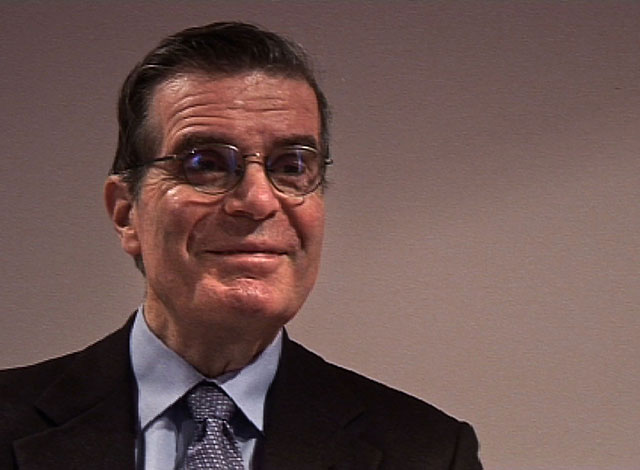
It’s said that Obama is also writing a letter, in this case to Iran. Do you have any idea where he got that idea?
“It so happens … Well, I don’t think he got it from me [and my letter to Khrushchev during the Cuban Missile Crisis], but it so happens that in terms of letters between the new president of the United States and the current president of Iran, I remember when that less than two years ago the president of Iran wrote a letter to President Bush. It was a letter that made all kinds of charges against the United States; it went on and on and on for pages, and the secretary of state brushed it aside. To the best of my knowledge, the letter was not even acknowledged, much less answered.
The letter to Khrushchev
In the worst moments of the Cuban Missile Crisis, Kennedy got a letter from Khrushchev. It went on for many many pages, it also made charges against the United States, and it also made threats and denials. Kennedy decided to answer that letter and that’s the answer he had me draft. My job was to pick up the positive notes in Khrushchev’s letter and respond in a positive way to them. And as reckless as some of the language may be of the Iranian president, I always felt that it would be possible to respond to some positive elements in that letter and least get a dialogue under way and I believe Obama can do that and we will have a new stage of relations with Iran. Just as Kennedy’s letter helped bring about an end to the Cuban Missile Crisis.”
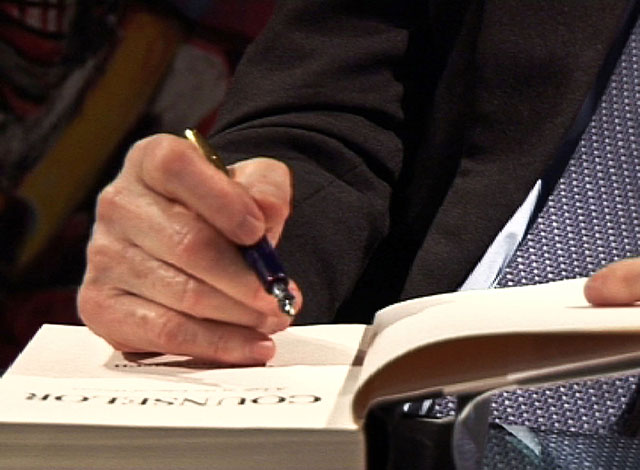
Some say Obama is all words, and no doubt he is a great communicator
“I think Obama is too smart to let him self be isolated in the White House. Bush was isolated in the White House, he didn’t have much curiosity about the whole world, he had never really travelled, had never taken any interest in foreign policy and he was surrounded in the White House by members of the right wing of his party, people who bowed down and saluted and praised and told him what he wanted to hear.
Kennedy was just the opposite. Kennedy made sure he heard both sides of an argument, that he heard from his friends in congress and politics in the country so he knew what was going on. He told his cabinet members before every press conference, ‘report to me what’s going on in your area of jurisdiction and you better include the bad news as well as the good because if I get surprised at a press conference with questions about bad news, that you haven’t told me about, you’re going to be sorry!’
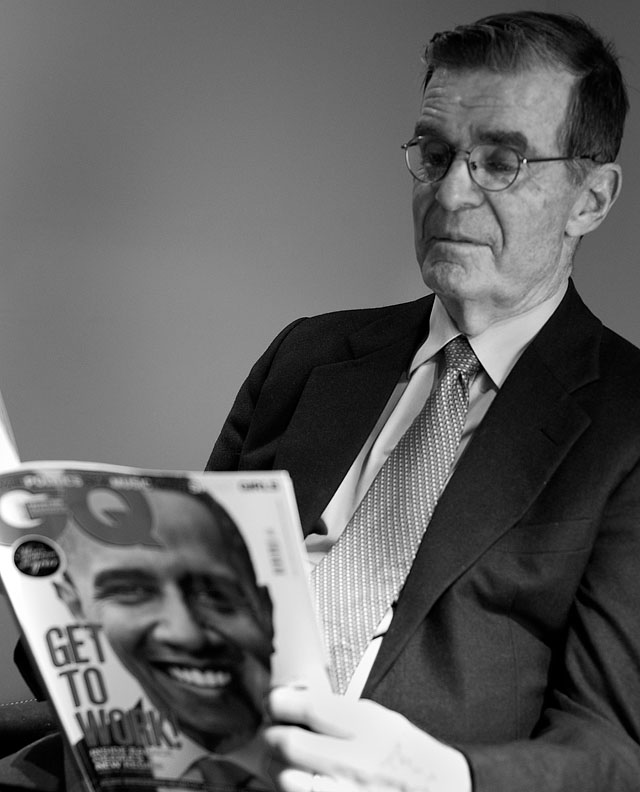
Obama is the same way. He doesn’t want to be isolated. He knows that first of all he is the father of a young family and he wants to spend time with his family, which was a reason for visiting schools. But he also knows that the president can do very little without the congress so he visited the congress. He said from the very beginning that he wanted to be president of all the people, so he has reached out to republicans and independents, as well as democrats, and he has already been in communication with other leaders of the world. Just as Kennedy was with Russian president Khrushchev, with president of Egypt Gamal Abdel Nasser, French president Charles de Gaulle, with all kinds of leaders. And when Obama’s opponents said during the campaigns, both for the nomination and the election, ‘ooh year, he make good speeches but those are just words’ – what are they talking about. Just words? That’s how a president operates, through just words and rhetoric! That’s how a president galvanizes support for his program in the country, that’s how a president mobilizes support for his program in the congress, that’s how a president inspires support for his leadership around the world! That’s how a president gets things done. They’re not just words, those words are presidential tools.“
Obama’s campaign slogan was Yes We Can. Do you think he can fulfill what he has promised for the American people?
“Obama has raised all kinds of hope and expectations on the widest range of issues, turning around the disasters of the last eight years. And I believe, yes he can.”
- END -
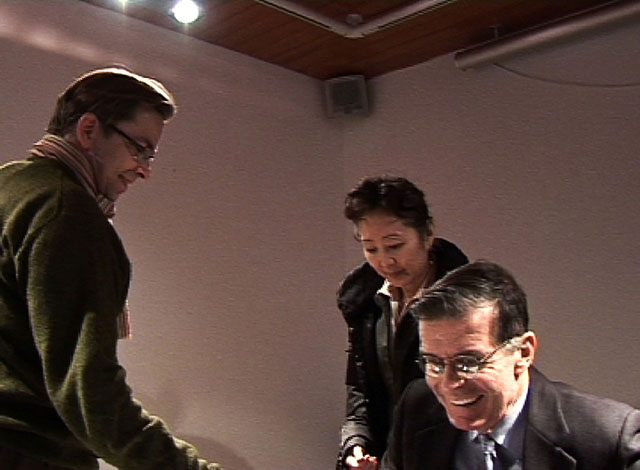
Thorsten Overgaard (44) is a Danish feature writer and photographer and a personal friend of Ted Sorensen. Together they traveled to Mors Island in Denmark in 2003 to research the Sorensen family roots as part of Ted Sorensen’s research to his 2008-biography, “Counselor – A Life on the Edge of History.”
“He was particular interested in why they had left Denmark a little over 100 years ago,” Thorsten Overgaard recalls. “But mainly he was concerned ‘what if they hadn’t emigrated?’” 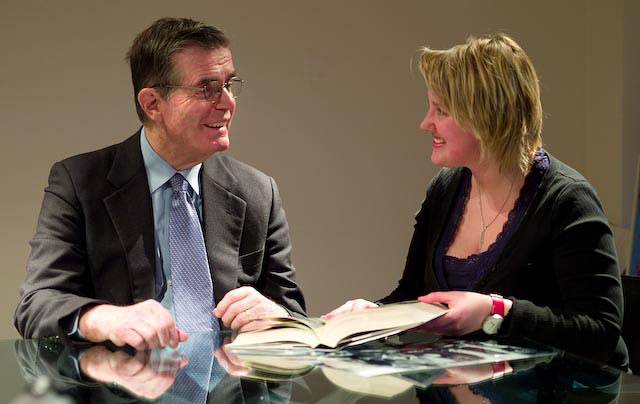
Ted Sorensen and Emma Brumpton look at old photographs from the AP archive of JFK campaigning (Photo: Thorsten Overgaard)
|
![]()
